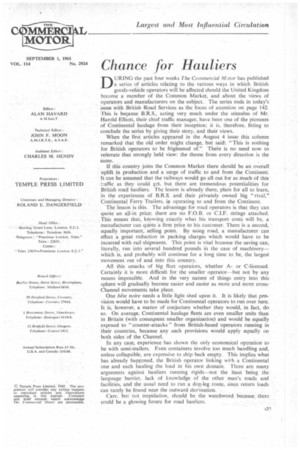Chance for Hauliers
Page 25

If you've noticed an error in this article please click here to report it so we can fix it.
DUR1NG the past four weeks The Commercial Mawr has published a series of articles relating to the various ways in which British goods-vehicle operators will be affected should the United Kingdom become a member of the Common Market, and about the views of operators and manufacturers on the subject. The series ends in today's issue with British Road Services as the focus of attention on page 142. This is because B.R.S., acting very much under the stimulus of Mr. Harold Elliott, their chief traffic manager, have been one of the pioneers of Continental haulage from their inception; it is. therefore, fitting to conclude the series by giving their story, and their views.
When the first articles appeared in the August 4 issue this column remarked that the old order might change, but said: "This is nothing for British operators to be frightened of." There is no need now to reiterate that strongly held view: the theme from every direction is the same. .
If this country joins the Common Market there should be an overall uplift in production and a surge of traffic to and from the Continent. It can be assumed that the railways would go all out for as much of this 1..-affic as they could get, but there are tremendous potentialities for British road hauliers. The lesson is already there, plain for all to learn, in the experiences of B.R.S. and their privately owned big "rival," Continental Ferry Trailers, ip operating to and from the Continent.
The lesson is this. The advantage for road operators is that they can quote an all-in price: there are no F.O.B. or C.I.F. strings attached. This means that, knowing exactly what his transport costs will be, a manufacturer can quote a firm price to his customer. There is a second, equally important, selling point. By using road, a manufacturer can effect a great reduction in packing charges which would have to be incurred with rail shipments. This point is vital because the saving can, literally, run into several hundred pounds in the case of machinery— which is, and probably will continue for a long time to be. the largest movement out of and into this country.
All this smacks of big fleet operators, whether Aor C-licensed. Certainly it is more difficult for the smaller operator—but not by any means impossible. And in the very nature of things entry into this sphere will gradually become easier and easier as more and more crossChannel movements take place.
One bete noire needs a little light shed upon it. It is likely that provision would have to be made for Continental operators to run over here. It is, however, a matter of conjecture whether they would, in fact, do so. On average, Continental haulage fleets are even smaller units than in Britain (with consequent smaller organization) and would be equally exposed to "counter-attacks" from British-based operators running in their countries, because any such provisions would apply equally on both sides of the Channel.
In any case, experience has shown the only economical operation to be with semi-trailers. Even containers involve too much handling and. unless collapsible, are expensive to ship back empty. This implies what has already happened, the British operator linking with a Continental one and each hauling the load in his own domain. There are many arguments against hauliers running rigids—not the least being the 'language barrier, lack of knowledge of the other man's roads and facilities, and the usual need to run a dog-leg route, since return loads can rarely be found near the outward destination.
Care, but riot trepidation, should be the watchword because. there could be a glowing future for road hauliers.
























































































































